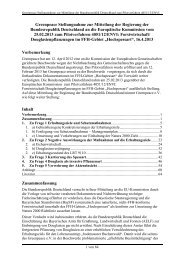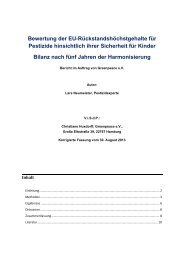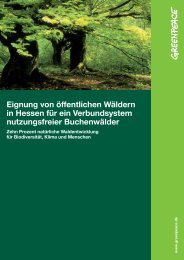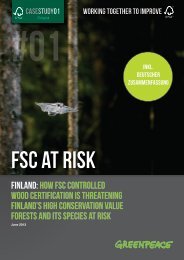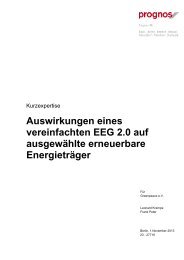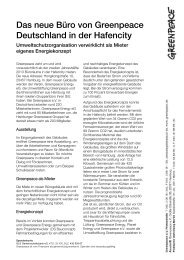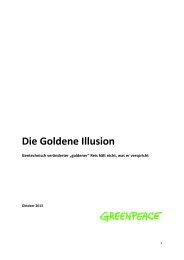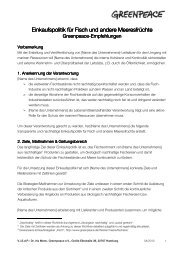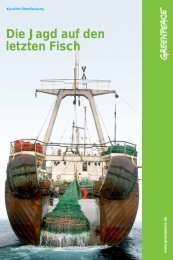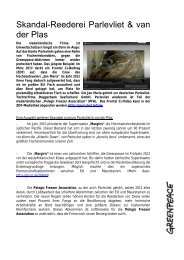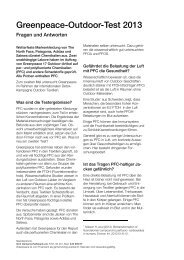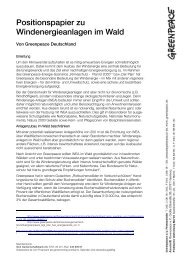HOW THE PALM OIL INDUSTRY IS - Greenpeace
HOW THE PALM OIL INDUSTRY IS - Greenpeace
HOW THE PALM OIL INDUSTRY IS - Greenpeace
Create successful ePaper yourself
Turn your PDF publications into a flip-book with our unique Google optimized e-Paper software.
executive summary<br />
Indonesia’s peatland<br />
Carbon stocks plummet<br />
as palm oil demand soars<br />
Every year, 1.8 billion tonnes (Gt) of climate changing greenhouse<br />
gas (GHG) emissions are released by the degradation and<br />
burning of Indonesia’s peatlands – 4% of global GHG emissions<br />
from less than 0.1% of the land on earth.<br />
This report shows how, through growing demand for palm oil, the<br />
world’s largest food, cosmetic and biofuel industries are driving<br />
the wholesale destruction of peatlands and rainforests. These<br />
companies include Unilever, Nestlé and Procter & Gamble, who<br />
between them account for a significant volume of global palm oil<br />
use, mainly from Indonesia and Malaysia.<br />
Overlaying satellite imagery of forest fires with maps indicating the<br />
locations of the densest carbon stores in Indonesia, <strong>Greenpeace</strong><br />
researchers have been able to pinpoint carbon ‘hotspots’. Our<br />
research has taken us to the Indonesian province of Riau on the<br />
island of Sumatra, to document the current activities of those<br />
involved in the expansion of palm oil. These are the producers who<br />
trade with Unilever, Nestlé and Procter & Gamble, as well as many<br />
of the other top names in the food, cosmetic and biofuel industries.<br />
The area of peatland in Riau is tiny: just 4 million hectares,<br />
about the size of Taiwan or Switzerland. Yet Riau’s peatlands<br />
store 14.6Gt of carbon – if these peatlands were destroyed, the<br />
resulting GHG emissions would be equivalent to one year’s total<br />
global emissions.<br />
Unless efforts are made to halt forest and peatland destruction,<br />
emissions from these peatlands may trigger a ‘climate bomb’.<br />
Forests as ticking<br />
climate bombs<br />
Forest ecosystems currently store about one and a half times<br />
as much carbon as is present in the atmosphere. Without<br />
drastic cuts in GHG emissions, climate change – which is in<br />
part driven by forest destruction – may soon tip these carbon<br />
stores into sources of emissions. Resulting temperature<br />
increase could disrupt ecosystems in ways that provoke yet<br />
more greenhouse emissions, potentially leading to further<br />
acceleration of climate change.<br />
Conclusions from the world’s leading climate scientists in<br />
the Intergovernmental Panel on Climate Change (IPCC)<br />
show that large cuts in GHG emissions are needed rapidly.<br />
Time is desperately short. The greater the delay in realising<br />
emissions reductions, the higher the financial, social and<br />
ecological costs will be.<br />
indonesia’s rainforests<br />
and peatlands in the<br />
political spotlight<br />
Indonesia offers a critical example of why GHG emissions arising<br />
from deforestation and land-use change need to be dealt with at<br />
the international level, by governments and corporations.<br />
Indonesia holds the global record for GHG emissions through<br />
deforestation, putting it third behind the USA and China in<br />
terms of total man-made GHG emissions. During the last 50<br />
years, over 74 million hectares of Indonesia’s forests have<br />
been destroyed – logged, burned, degraded, pulped – and its<br />
products shipped round the planet.<br />
Unlike industrialised country (Annex I) signatories to the Kyoto<br />
climate treaty, Indonesia – as a developing country – is not required<br />
to set a target to reduce its GHG emissions. Consequently,<br />
since the Kyoto Protocol provides no incentives for preventing<br />
the destruction of tropical forests, the expansion of palm oil into<br />
carbon-rich landscapes such as peatlands and rainforests makes<br />
short-term economic sense but no ecological sense.<br />
In December 2007, negotiating teams from governments<br />
around the world will gather in Bali, Indonesia to thrash out an<br />
agreement that will ideally lead to an international plan to deliver<br />
deep cuts in global GHG emissions, as an extension of the<br />
current Kyoto climate treaty.<br />
These climate negotiations are first steps toward international<br />
political measures to tackle deforestation. Meanwhile, global<br />
industry continues business-as-usual, and is expanding into<br />
the world’s rainforests.<br />
Palm oil’s BOOM!<br />
NASA’s climate scientists warn that ‘continued rapid<br />
growth of CO 2<br />
emissions and infrastructure for another<br />
decade’ may make halting high-risk increase in global<br />
temperatures ‘impractical if not impossible’.



